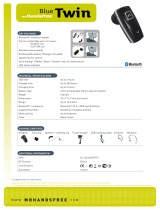Page is loading ...

Enjoy wireless handsfree talking!
Lightweight and ergonomic
Embrace the convenience of the lightweight and ergonomically optimized Vox 150. You
can comfortably talk for hours and with the included ultra-portable USB charger you will
not add another bulky charger to your travel accessories.
Talk freely - handsfree and wireless
• Wireless call management
• Bluetooth enabled wireless handsfree talking
Pack lightly - charge via USB
• USB charging cable for extra mobility
Wear it comfortably for hours!
• Light weight headset design
• Ergonomic earhook
Works with your Bluetooth enabled phone
• Bluetooth HSP/HFP compliant - Universal
Philips
Bluetooth Headset
VOX150

VOX150/01
Bluetooth Headset
Specifications Product highlights
Connectivity
• Bluetooth profiles: Handsfree, Headset
• Bluetooth version: 1.1
• Maximum range: Up to 10 metres m
Power
• Talk time: Up to 6 hours
• Standby time: Up to 160 hours
• Rechargeable
• Battery Type: LI-Polymer
Convenience
•Volume control
Dimensions
• Product weight (g): 18
Accessories
• USB cable: USB charging cable included
• Charger: Charger included
• IFU / User Manual: Dutch, English, French,
German, Italian
• Warranty Card
Outer Carton
• 12NC: 996140005293
• EAN/UPC/GTIN: 87 10895 95636 9
• Gross weight: 1.683 kg
• Height: 150 mm
• Length: 387 mm
• Quantity: 5
• Tare weight: 0.980 kg
• Width: 326 mm
Packaging Data
• 12NC: 996140005293
• EAN/UPC/GTIN: 87 10895 92757 4
• Gross weight: 0.257 kg
• Height: 74 mm
• Length: 300 mm
• Tare weight: 0.120 kg
• Width: 136 mm
•
Issue date 2007-08-04
Version: 1.0
12 NC: 9961 400 05293
EAN: 87 10895 92757 4
© 2007 Koninklijke Philips Electronics N.V.
All Rights reserved.
Specifications are subject to change without notice.
Trademarks are the property of Koninklijke Philips
Electronics N.V. or their respective owners.
www.philips.com
Wireless call management
Manage your call without using your mobile phone. This
includes call aceptance, rejection, voice dial and redial.
Voice dial and redial have to be supported by your mobile
phone.
Wireless handsfree talking
Using your cellphone without a headset can be
inconvenient and unsafe. In many locations it is also illegal
while driving. Wired handsfree kits add the hassle of a
cable. A Bluetooth headset replaces the cable with a short
range wireless Bluetooth connection, so your hands are
free and your freedom to move is not hampered by a
cable. Because the transmitted energy close to your head
is much lower than that radiated from your mobile phone
Bluetooth also decreases potential risks associated with
cellphone radiation.
USB charging cable
Simply plug the USB charging cable into the USB port of
your computer, connect the cable with your headset and
the charging begins.
Light weight headset design
Weight is a key factor affecting wearing comfort for
bluetooth headsets, as the ear carries all the weight. A
light-weight headset will apply less pressure to the ears,
and be more comfortable, especially when worn for a
long time. By carefuelly designing the headset and
choosing advanced materials and components the weight
of this headset was optimized.
Ergonomic earhook
The ergonomic earhooks size can be adapted in various
steps to fit your ears, which will not only increase comfort
but also ensure a safe fixture. In addtion the earhook can
be adapted to acomodate both left - and right-ear wearing
styles.
Bluetooth HSP/HFP compliant
Bluetooth is a cable replacement technology. Bluetooth is
a global standard, so Bluetooth devices of different
manufacturers can interoperate using shared Bluetooth
profiles. HSP (Handset Profile) and HFP (Handsfree
Profile) are the profiles required for typical Bluetooth
headset operations. If your mobile phone is compliant to
HSP or HFP (like virtually any Bluetooth enabled phone)
this headset will work with it. The Bluetooth word mark
and logos are owned by the Bluetooth SIG, Inc. and any
use of such marks by Koninklijke Philips Electronics N.V.
is under license.
/

